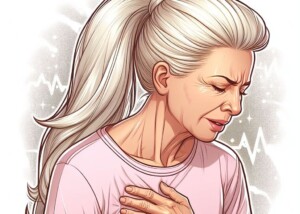
Ever rise from a chair after sitting for a while and feel lightheaded or that the room is blacking out? Could this eventually harm your brain?
You then must pause in your tracks with your head down until the feeling passes.
The experience is described several different ways: feeling faint, feeling like one is about to pass out, feeling dizzy or seeing the room go dark.
“This is diagnosed by a drop in systolic blood pressure of over 20 mmHg when standing up from a sitting or lying position,” says Dr. David Beatty, MD, a retired general practitioner with 30+ years of experience and an instructor of general medicine for 20+ years.
“Most people will begin to feel lightheaded if the systolic pressure is below 80 mmHg.
“On standing, blood drains to the feet, and there’s a short-term lack of blood to the brain.”
And this begs the question: Can repeated episodes of standing up and getting faint eventually harm one’s brain — as in — causing a cognitive problem?
Oxygen and the Brain
A study found a link between this common phenomenon in middle age and the development of dementia 20 years later.
A change in position that causes blood pressure to drop is called orthostatic hypotension.
The research comes from the Johns Hopkins Bloomberg School of Public Health.
• The study began in 1987 involving 11,503 people between 45 and 64.
• The participants did not have a history of heart disease or stroke.
• They lied down for 20 minutes, then upon standing their blood pressure was recorded.
• 703 of the subjects had orthostatic hypotension.
• The subjects were followed for 20+ years.
• Those who had shown orthostatic hypotension at the initial visit were 40 percent more likely to develop dementia than were subjects who had not.
However, the researchers were not able to establish cause and effect; only an association.
Two explanations exist for the association.
One, the condition indicates the presence of another disease process that ultimately leads to dementia.
Two, the orthostatic hypotension itself leads to dementia – because the brief episodes of deprived blood flow to the brain have a cumulative effect.
There may be a third — but yet unknown — explanation for the association.
Study Limitations
• It’s not known if the subjects went on to have continued bouts with orthostatic hypotension in the ensuing years.
• Other factors were not adjusted for such as exercise habits and well-known risk factors for cognitive decline.
How to Prevent Orthostatic Hypotension
“Get up slowly,” says Dr. Beatty. “This is probably all most people need to do — especially when getting out of bed in the morning.
“Get the legs moving while still lying down.
“Slowly move to a sitting position and hold that for a while, still moving the feet and bending the knees. Gradually stand.
“Keep well-hydrated.
“Occasionally increasing the dietary salt might be needed, but discuss this with your doctor first.
“Compression stockings may reduce blood pooling in the legs, and this might be particularly helpful with bad varicose veins.
“Compression stockings would not be a good idea in someone with peripheral vascular disease.
“If you have any cause of blood loss, such as heavy periods, a blood test to exclude anemia might be worthwhile.
“If the lightheaded feeling persists it’s best to sit, or preferably lie down.
“Raise the legs and move the muscles of the legs to pump blood back to the core of the body.”
Another trick is to clench the fists for 30 seconds before you stand up and keep them clenched while your blood pressure is adjusting to the change in position.
Are you already on a medication?
“If you are on tablets that lower blood pressure discuss the postural hypotension with your doctor,” says Dr. Beatty.
“People usually take blood pressure tablets in the morning.
“If you take two or more tablets for this they may be having an additive and maximal effect late morning, causing the blood pressure to drop too much at that time. Sometimes staggering the doses helps this.
“The ACE inhibitors can have a ‘first dose effect’ when the BP is drastically lowered after the first exposure to the drug.
“The initial dose of these drugs is usually best taken when lying down at night.
“In extreme cases a tablet, such as fludrocortisone, is used to keep the BP from dropping.”

 Dr. Beatty has worked in primary medicine, surgery, accident and emergency, OBGYN, pediatrics and chronic disease management. He is the Doctor of Medicine for
Dr. Beatty has worked in primary medicine, surgery, accident and emergency, OBGYN, pediatrics and chronic disease management. He is the Doctor of Medicine for 







































